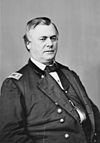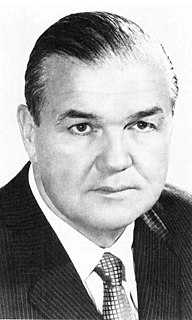
Michael J. Howlett Sr. was a Democratic politician from the U.S. state of Illinois, who was elected several times to statewide office.

The 2006 Oregon gubernatorial election took place on November 7, 2006. Incumbent Democratic Governor of Oregon Ted Kulongoski ran for a second and final term as governor. Kulongoski faced several challengers in his primary, whom he dispatched to win his party's nomination a second time, while Republican nominee Ron Saxton, the former Chair of the Portland Public Schools Board and a candidate for governor in 2002 emerged from a crowded primary. Kulongoski and Saxton were initially going to be challenged in the general election by State Senator Ben Westlund, but Westlund withdrew his candidacy before the general election. There were, however, a number of strong independent challengers, the most notable of whom was Mary Starrett, the Constitution Party nominee. In a hard-fought campaign, Kulongoski won re-election by a surprisingly wide margin, winning his second term as governor.

The 1856 Republican National Convention, also known as the first Republican National Convention, met from June 17 to June 19, 1856, at the Musical Fund Hall in Philadelphia, Pennsylvania, USA. The gathering nominated John C. Frémont, formerly a lieutenant colonel in the United States Army and Senator from California, and former Senator William Dayton of New Jersey for President and Vice President. Frémont and Dayton were the new party's standard-bearers in the 1856 presidential election. The convention also appointed a Republican National Committee to govern the new organization.
The 2006 Election for statewide offices in the State of Illinois were held on 7 November 2006. On that date, registered voters in the State of Illinois were eligible to elect officeholders in six statewide offices: the office of Governor of Illinois, Lieutenant Governor of Illinois, Illinois Attorney General, Illinois Secretary of State, Illinois Treasurer and Illinois Comptroller.
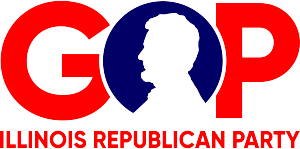
The Illinois Republican Party is the state-level affiliate of the Republican Party in Illinois. Since May 17, 2014, it has been chaired by Tim Schneider. The party is one of two legally established, statewide political parties in Illinois, the other being the Democratic Party.

The 2010 Illinois gubernatorial election took place on November 2, 2010. Incumbent Democratic Governor Pat Quinn sought and was elected to a full term in office. Quinn was elected as the Democratic nominee, the Illinois Green Party nominee was attorney and 2006 nominee Rich Whitney, the Republican nominee was State Senator Bill Brady, the Libertarian Party nominee was Lex Green, and Scott Lee Cohen ran as an independent. Governor Quinn won election to a full term in a very close race, beating Senator Brady by only about 32,000 votes, despite Brady winning in 98 of 102 Illinois counties.
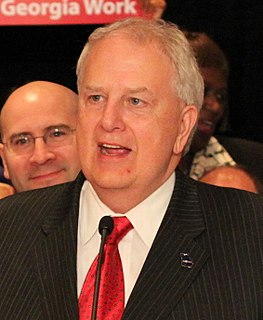
The 1998 Georgia gubernatorial election was held on November 3, 1998. Incumbent Democratic Governor Zell Miller was unable to seek re-election due to term limits, therefore creating an open seat. To replace him, State Representative Roy Barnes won the Democratic Party's nomination after a close and highly contested primary election, while businessman Guy Millner, who had run for Governor and the United States Senate in the previous four years, won the nomination of the Republican Party. In the general election, Barnes was able to defeat Millner by a margin of victory larger than Governor Miller's victory over Millner four years prior, which was in part due to the unpopularity and controversy of Mitch Skandalakis, the Republican nominee for Lieutenant Governor of Georgia. As of 2018, this is the most recent election in which a Democrat was elected Governor of Georgia.

The 1952 United States presidential election in Pennsylvania took place on November 4, 1952. Voters chose 32 representatives, or electors to the Electoral College, who voted for president and vice president.
The Palos Township Republican Organization is the township-level affiliate of the Republican Party in Cook County. Since January, 2012, it has been chaired by Committeeman Sean Morrison. The party is one of two legally established, statewide political parties in Illinois.

The Illinois gubernatorial election of 1872 was the fifteenth election for this office. Republican nonimee, Former Governor Richard J. Oglesby defeated the Democratic and Liberal Republican nominee Gustavus Koerner. B. G. Wells represented Independent Democrats unwilling to ally with Liberal Republicans. Oglesby had agreed to run for the Governorship but to resign upon being elected so that Lt. Governor John Lourie Beveridge could assume the office. Oglesby was in turn appointed to the U.S. Senate.
Alexander Starne was an American politician from Pennsylvania. He moved to Illinois as a young man and rose to become both Illinois Secretary of State and Illinois Treasurer.

The 1952 United States presidential election in Virginia took place on November 4, 1952. Voters chose 12 representatives, or electors to the Electoral College, who voted for president and vice president.

A general election was held in the U.S. state of Indiana on November 4, 2014. Three of Indiana's executive officers were up for election as well as all of Indiana's nine seats in the United States House of Representatives. The Republican nominees won all three statewide elections and all of Indiana's U.S. Representatives were re-elected.

United States gubernatorial elections were held on November 6, 2018 in 36 states and three territories. These elections formed part of the 2018 United States elections. Other coinciding elections were the 2018 United States Senate elections and the 2018 United States House of Representatives elections. The last regular gubernatorial elections for all but three of the states took place in 2014. Governors in New Hampshire and Vermont serve two-year terms, meaning that their most recent gubernatorial elections took place in 2016. Meanwhile, Oregon held a special election in 2016 to fill an unexpired term.

The 2016 United States presidential election in Illinois was held on November 8, 2016, as part of the 2016 General Election in which all 50 states plus The District of Columbia participated. Illinois voters chose 20 electors to represent them in the Electoral College via a popular vote pitting the Republican Party's nominee, businessman Donald Trump, and running mate Indiana Governor Mike Pence against Democratic Party nominee, former Secretary of State Hillary Clinton and her running mate, Virginia Senator Tim Kaine.

The 1964 Arizona gubernatorial election took place on November 3, 1964. Incumbent Governor Paul Fannin decided not to run for reelection to a fourth term as governor, instead deciding to successfully run for the United States Senate when incumbent U.S. Senator Barry Goldwater decided to run for President of the United States.

Elections to the United States Senate will be held on November 8, 2022 with 34 of the 100 seats in the Senate being contested in regular elections, the winners of which will serve six-year terms in the United States Congress from January 3, 2023 to January 3, 2029. Senators are divided into three groups, or Classes, whose terms are staggered so that a different class is elected every two years. Class 3 Senators were last elected in 2016, and will be up for election again in 2022.

A general election was held in the U.S. state of New Mexico on November 6, 2018. All of New Mexico's executive officers will be up for election as well as a United States Senate seat, and all of New Mexico's three seats in the United States House of Representatives.

In the Chicago mayoral election of 1897 Democratic nominee Carter Harrison Jr. was elected, winning a majority of the vote and defeating independent Republican John Maynard Harlan, Republican nominee Nathaniel C. Sears, independent Democrat Washington Hesing, as well as several minor candidates. Harrison carried a 26.7 point lead over second-place finisher Harlan, a margin greater than Harlan's vote share itself.
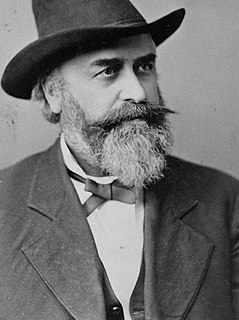
In the Chicago mayoral election of 1877 Democrat Carter Harrison Sr. defeated both Republican Abner Wright and socialist Ernest Schmidt in a three-way race. Harrison had a nearly nine point margin of victory.



